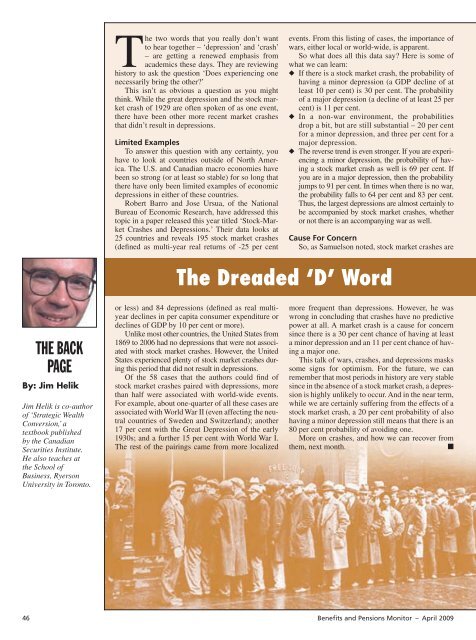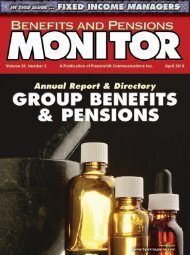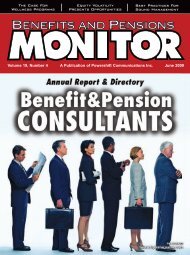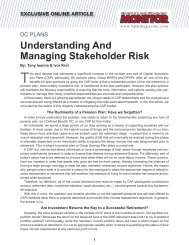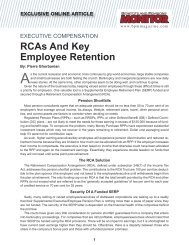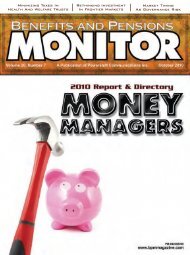April - Benefits and Pensions Monitor
April - Benefits and Pensions Monitor
April - Benefits and Pensions Monitor
You also want an ePaper? Increase the reach of your titles
YUMPU automatically turns print PDFs into web optimized ePapers that Google loves.
The two words that you really don’t want<br />
to hear together – ‘depression’ <strong>and</strong> ‘crash’<br />
– are getting a renewed emphasis from<br />
academics these days. They are reviewing<br />
history to ask the question ‘Does experiencing one<br />
necessarily bring the other?’<br />
This isn’t as obvious a question as you might<br />
think. While the great depression <strong>and</strong> the stock market<br />
crash of 1929 are often spoken of as one event,<br />
there have been other more recent market crashes<br />
that didn’t result in depressions.<br />
Limited Examples<br />
To answer this question with any certainty, you<br />
have to look at countries outside of North America.<br />
The U.S. <strong>and</strong> Canadian macro economies have<br />
been so strong (or at least so stable) for so long that<br />
there have only been limited examples of economic<br />
depressions in either of these countries.<br />
Robert Barro <strong>and</strong> Jose Ursua, of the National<br />
Bureau of Economic Research, have addressed this<br />
topic in a paper released this year titled ‘Stock-Market<br />
Crashes <strong>and</strong> Depressions.’ Their data looks at<br />
25 countries <strong>and</strong> reveals 195 stock market crashes<br />
(defined as multi-year real returns of -25 per cent<br />
events. From this listing of cases, the importance of<br />
wars, either local or world-wide, is apparent.<br />
So what does all this data say? Here is some of<br />
what we can learn:<br />
◆ If there is a stock market crash, the probability of<br />
having a minor depression (a GDP decline of at<br />
least 10 per cent) is 30 per cent. The probability<br />
of a major depression (a decline of at least 25 per<br />
cent) is 11 per cent.<br />
◆ In a non-war environment, the probabilities<br />
drop a bit, but are still substantial – 20 per cent<br />
for a minor depression, <strong>and</strong> three per cent for a<br />
major depression.<br />
◆ The reverse trend is even stronger. If you are experiencing<br />
a minor depression, the probability of having<br />
a stock market crash as well is 69 per cent. If<br />
you are in a major depression, then the probability<br />
jumps to 91 per cent. In times when there is no war,<br />
the probability falls to 64 per cent <strong>and</strong> 83 per cent.<br />
Thus, the largest depressions are almost certainly to<br />
be accompanied by stock market crashes, whether<br />
or not there is an accompanying war as well.<br />
Cause For Concern<br />
So, as Samuelson noted, stock market crashes are<br />
The Dreaded ‘D’ Word<br />
THE BACK<br />
PAGE<br />
By: Jim Helik<br />
Jim Helik is co-author<br />
of ‘Strategic Wealth<br />
Conversion,’ a<br />
textbook published<br />
by the Canadian<br />
Securities Institute.<br />
He also teaches at<br />
the School of<br />
Business, Ryerson<br />
University in Toronto.<br />
or less) <strong>and</strong> 84 depressions (defined as real multiyear<br />
declines in per capita consumer expenditure or<br />
declines of GDP by 10 per cent or more).<br />
Unlike most other countries, the United States from<br />
1869 to 2006 had no depressions that were not associated<br />
with stock market crashes. However, the United<br />
States experienced plenty of stock market crashes during<br />
this period that did not result in depressions.<br />
Of the 58 cases that the authors could find of<br />
stock market crashes paired with depressions, more<br />
than half were associated with world-wide events.<br />
For example, about one-quarter of all these cases are<br />
associated with World War II (even affecting the neutral<br />
countries of Sweden <strong>and</strong> Switzerl<strong>and</strong>); another<br />
17 per cent with the Great Depression of the early<br />
1930s; <strong>and</strong> a further 15 per cent with World War I.<br />
The rest of the pairings came from more localized<br />
more frequent than depressions. However, he was<br />
wrong in concluding that crashes have no predictive<br />
power at all. A market crash is a cause for concern<br />
since there is a 30 per cent chance of having at least<br />
a minor depression <strong>and</strong> an 11 per cent chance of having<br />
a major one.<br />
This talk of wars, crashes, <strong>and</strong> depressions masks<br />
some signs for optimism. For the future, we can<br />
remember that most periods in history are very stable<br />
since in the absence of a stock market crash, a depression<br />
is highly unlikely to occur. And in the near term,<br />
while we are certainly suffering from the effects of a<br />
stock market crash, a 20 per cent probability of also<br />
having a minor depression still means that there is an<br />
80 per cent probability of avoiding one.<br />
More on crashes, <strong>and</strong> how we can recover from<br />
them, next month.<br />
■<br />
46 <strong>Benefits</strong> <strong>and</strong> <strong>Pensions</strong> <strong>Monitor</strong> – <strong>April</strong> 2009


